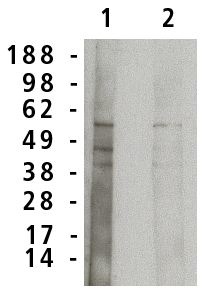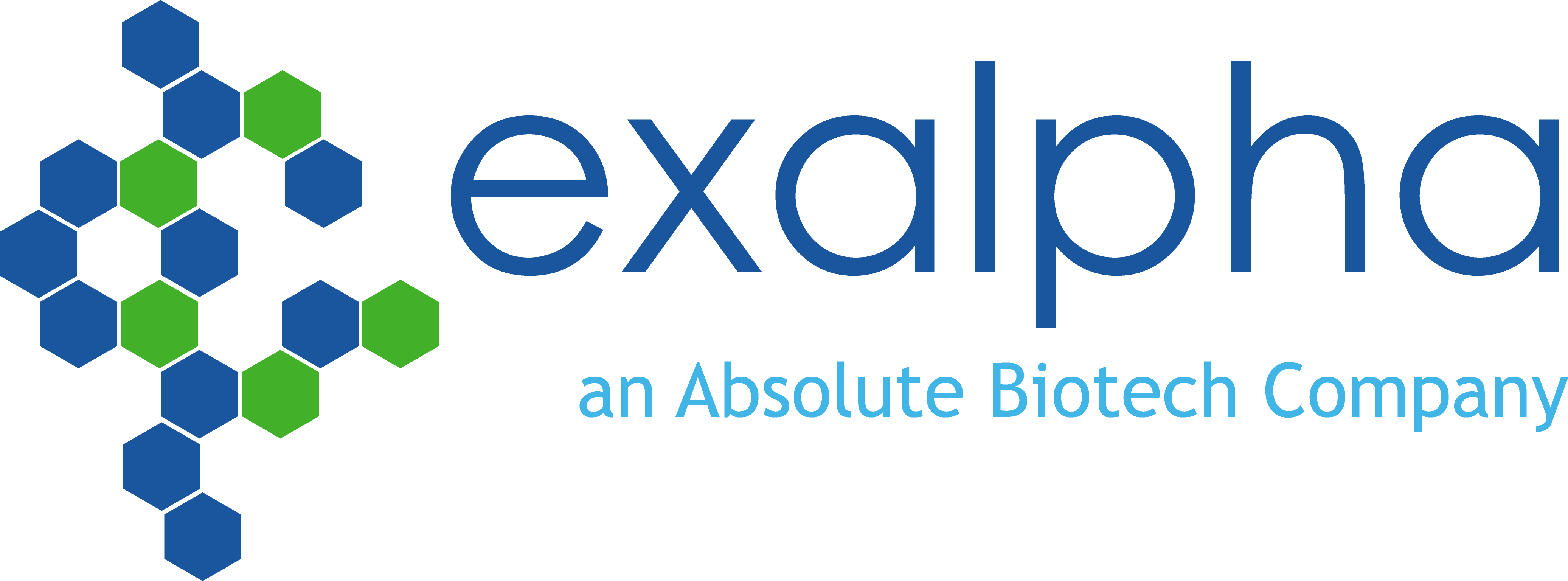Catalogue

Rabbit anti Human Acid Sphingomyelinase
Catalog number: X1695P$475.00
Add To Cart| Isotype | N/A |
| Product Type |
Polyclonal Antibody |
| Units | 100 µg |
| Host | Rabbit |
| Species Reactivity |
Human |
| Application |
ELISA Western Blotting |
Background
Human acid sphingomyelinase (sphingomyelin phosphodiesterase, ASM) is the lysosomal enzyme responsible for the hydrolysis of sphingomyelin to ceramide and phosphocholine. Converts sphingomyelin to ceramide. aSM also has phospholipase C activities toward 1,2-diacylglycerol-phosphocholine and 1,2-diacylglycerol-phosphoglycerol. The enzyme is a membrane-associated glycoprotein with a pH optimum of about 4.5 and a subunit molecular mass of about 72 kDa. In addition AtoS M, two other sphingomyelinases have been identified in man, a Mg2+- dependent neutral sphingomyelinase found primarily in brain and a Zn2+-dependent acid sphingomyelinase found primarily in serum. Although it is likely that the acid and neutral sphingomyelinases are coded by different genes, the molecular genetic relationship of these three biochemically distinct sphingomyelinases has not been determined. Understanding the role of these sphingomyelinases in the hydrolysis of sphingomyelin to ceramide will be an important step in the understanding of ceramide as it is further hydrolyzed to sphingosine, a neutral phospholipid which has been implicated in the regulation of protein kinase C-mediated signal transduction. Inherited deficiencies of ASM have been reported in man, deficient ASM activity results in the two major subtypes of Niemann-Pick disease (NPD).
Synonyms: Acid Sphingomyelinase, aSMase, SMPD1, ASM, Sphingomyelin phosphodiesterase, ASM-1
Source
Rabbits were immunized with a synthetic peptide derived from human acid sphingomyelinase protein.
Product
Product Form: Unconjugated
Formulation: Provided as solution in phosphate buffered saline with 0.08% sodium azide
Purification Method: Ammonium Sulfate Precipitation
Concentration: See vial for concentration
Applications
Antibody can be used for Western blots (5-10 µg/ml) and ELISA. Optimal concentration should be evaluated by serial dilutions.
Functional Analysis: Western Blotting
Storage
Product should be stored at -20°C. Aliquot to avoid freeze/thaw cycles
Product Stability: See expiration date on vial
Shipping Conditions: Ship at ambient temperature, freeze upon arrival
Caution
This product is intended FOR RESEARCH USE ONLY, and FOR TESTS IN VITRO, not for use in diagnostic or therapeutic procedures involving humans or animals. It may contain hazardous ingredients. Please refer to the Safety Data Sheets (SDS) for additional information and proper handling procedures. Dispose product remainders according to local regulations.This datasheet is as accurate as reasonably achievable, but our company accepts no liability for any inaccuracies or omissions in this information.
References
1. Human acid sphingomyelinase. Isolation, nucleotide sequence and expression of the full-length and alternatively spliced cDNAs.;
Schuchman E.H., Suchi M., Takahashi T., Sandhoff K., Desnick R.J.; J. Biol. Chem. 266:8531-8539(1991)
2. Molecular cloning of the acid sphingomyelinase of the mouse and the organization and complete nucleotide sequence of the gene.; Newrzella D., Stoffel W.; Biol. Chem. Hoppe-Seyler 373:1233-1238(1992)
3. Cloning of a human acid sphingomyelinase cDNA with a new mutation that renders the enzyme inactive.; Ida H., Rennert O.M., Eto Y., Chan W.Y.; J. Biochem. 114:15-20(1993)
4. Isolation of cDNA clones encoding human acid sphingomyelinase: occurrence of alternatively processed transcripts.; Quintern L.E., Schuchman E.H., Levran O., Suchi M., Ferlinz K., Reinke H., Sandhoff K., Desnick R.J.; EMBO J. 8:2469-2473(1989).
5. Functional characterization of the N-glycosylation sites of human acid sphingomyelinase by site-directed mutagenesis.; Ferlinz K., Hurwitz R., Moczall H., Lansmann S., Schuchman E.H., Sandhoff K.; Eur. J. Biochem. 243:511-517(1997)
6. Human acid sphingomyelinase.; Lansmann S., Schuette C.G., Bartelsen O., Hoernschemeyer J., Linke T., Weisgerber J., Sandhoff K.;Eur. J. Biochem. 270:1076-1088(2003).
Protein Reference(s)
Database Name: UniProt
Accession Number: P17405
Species Accession: Human
Safety Datasheet(s) for this product:
| EA_Sodium Azide |

Western blot analysis using acid sphingomyelinase antibody on normal human brain lysate (7 µg/lane). Antibody used at 1 µg/ml (1) and 0.5 µg/ml (2) and detected using mouse anti-rabbit antibody (Cat. No. X1207M) at 1:75k dilution and visualized using Pierce West Femto substrate.
